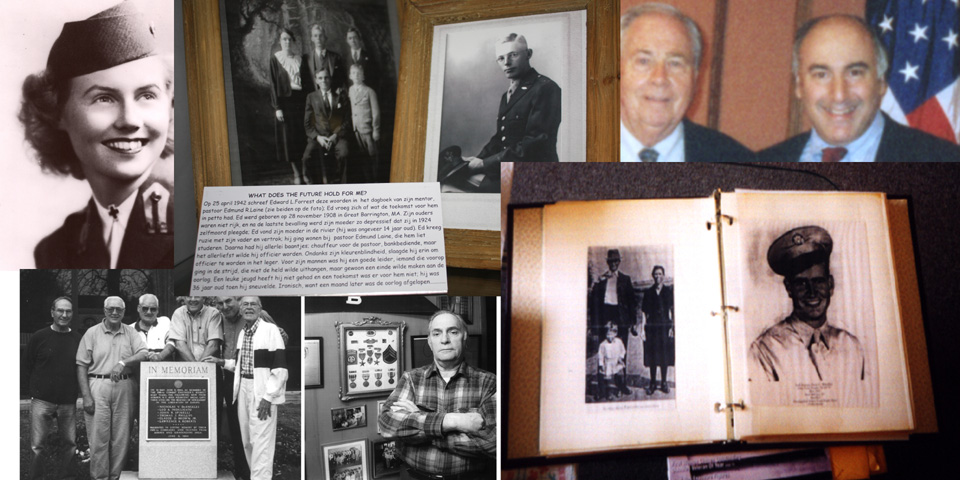
That’s me in the upper right hand corner of the photo above, okay, okay, the photo was taken 30 years ago and I’ve got a few more gray hairs today. Next to me in the photo is Vern Schmidt, a veteran of the 90th Infantry Division who recently turned 100 and is still very active in veterans events in Fresno, California.
Immediately to Vern’s right is Lieutenant Ed Forrest, who was killed on April 3, 1945 in the village of Heimboldshausen, Germany, and next to Ed is a family portrait — Ed is in the middle in the back row, flanked by his sister Vera and brother Elmer, while in the front row is Ed’s father and brother Warren. The portrait was sent by Elmer’s son to Wiel Goertzen, a history teacher in the Netherlands whose school adopted Ed’s grave in the American cemetery at Margraten, which explains why, if you look very closely, the inscription below the photo is in Dutch, as the school put up a display about Ed. Ed’s story is told in my book “Tanks for the Memories,” which is in an expanded third edition.
Going counterclockwise, the Red Cross girl in the next photo is Kay Brainard Hutchins. Kay’s brother Newell was killed on the ill-fated Kassel Mission of Sept. 27, 1944, which is the subject of my book “Up Above the Clouds to Die.”
Below Kay is a photo of five veterans of the 299th Combat Engineer Battalion (that’s me, second from the right). To my left in the photo is Chuck Hurlbut, who is featured in my book “9 Lives: An Oral History.” I interviewed Chuck individually and then he invited me up to Ithaca, New York, to meet some of his buddies, and we sat and talked for three hours in a mall with a waterfall in the background.
The center photo in the collage is of Ed Boccafogli, a veteran of the 82nd Airborne Division who jumped into Normandy on D-Day and later fought in Holland and the Battle of the Bulge. He’s featured in my book “A Mile in Their Shoes.”
The last photo is of two pages in the scrapbook of Arnold Brown, who was a rifle company commander in the 90th Infantry Division and is also one of the veterans who tells his story in “9 Lives.” The page on the left shows the Schilling family, in whose house in the village of Oberwampach, Luxembourg Arnold had his headquarters during the Battle of the Bulge. The 5-year-old boy in the picture got excited during heavy shelling and ran outside. Sergeant Hassel Whitfield, shown in the page on the right, ran out to bring the boy in and they were both mortally wounded. Then-Captain Brown put Sergeant Whitfield in for the Distinguished Service Cross, which he was awarded posthumously.